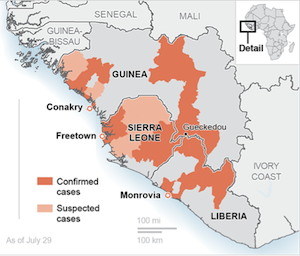LONDON -- Merck & Co.'s vaccine for Ebola is "highly effective," according to an interim analysis from a panel of experts who recommended that a late-stage trial should continue.
The vaccine was 100 percent effective when it was tested on more than 4,000 people who were in close contact with Ebola patients in the African nation of Guinea, according to a study published Friday in The Lancet medical journal. The trial of the vaccine, called Ebola ca Suffit -- "Ebola, that's enough" in French -- began March 23.
Ebola has killed more than 11,000 people in West Africa after an outbreak that began in late 2013. While the virus has fallen off sharply, it hasn't been eradicated, with seven confirmed cases in this week. The drug from Merck is one of several vaccines in clinical trials, with GlaxoSmithKline PLC and Novavax Inc. also developing medicines.
"This is an extremely promising development," Margaret Chan, director-general of the World Health Organization, said in a statement. "An effective vaccine will be another very important tool for both current and future Ebola outbreaks."
The vaccine was developed by the Public Health Agency of Canada and licensed to NewLink Genetics Corp. In November, Merck entered an agreement to research, develop and distribute the drug. Charles Link, NewLink's chief executive officer, said the company doesn't intend to make any significant profit in Africa or developing countries from the potential Ebola vaccine.
"We are really focused on doing everything we can to contribute and help in any material way that we can for the crisis in Africa," Link said on a conference call Friday to discuss earnings. The agreement with Merck envisions "significant" royalties coming from other parts of the world in the future, he said.
The Lancet, in an editorial accompanying the study, called the result a "remarkable scientific and logistical achievement."
In the trial, researchers vaccinated anyone in the close circle of contacts of a newly infected person, targeting those most likely to get the disease after a new case. The Lancet called it the largest-scale trial ever performed in Guinea.
People in the study were protected against the Ebola virus within six to 10 days of vaccination. The late-stage trial is continuing, and other studies are in progress, with the goal of submitting the vaccine for regulatory approval around the world.
To create the vaccine, scientists removed a gene from another virus, vesicular stomatitis, and replaced it with an Ebola virus gene that can't cause the disease alone. That could let people who get the vaccine develop antibodies against Ebola.
It's still unclear how significant or long the immune response to the vaccine will be, Merck said.
In other news, the United Nations Mission for Ebola Emergency Response is officially winding down Friday, handing its leadership role and senior staff over to the Geneva-based WHO as efforts to contain the deadly virus continue.
"We have reached an important milestone in the global Ebola response," U.N. Secretary-General Ban Ki-moon said in a statement Friday, while noting that that crisis "is not yet over."
The Ebola mission was established last year as the WHO struggled to get a handle on the outbreak. The WHO had been strongly criticized for fumbling its response to the epidemic, and the creation of the Ebola mission was widely seen as a rebuke to its leadership.
Speaking to reporters Friday, mission chief David Nabarro said he had seen signs that the WHO had already absorbed some of the lessons of the Ebola disaster, recovering its coordination role in West Africa and deploying 1,000 more staff members to the field.
"This is an example of the new WHO at work," he said.
Speaking alongside him was Chan, who said her agency was working to reform itself -- especially by establishing an emergency arm that would operate independently.
But Charles Clift, a public health expert at the London policy institute Chatham House, was unsure whether adding another department to WHO would help.
And despite the health agency's repeated vows to hold itself accountable, Clift was unconvinced. He noted that some of the WHO leaders in Africa blamed for the slow response to Ebola have since been moved to other countries.
Chan acknowledged that WHO was slow and that she was "absolutely accountable" for everything the agency does.
Information for this article was contributed by Oliver Staley of Bloomberg News and by Maria Cheng, Raphael Satter and Edith M. Lederer of The Associated Press.
A Section on 08/01/2015
